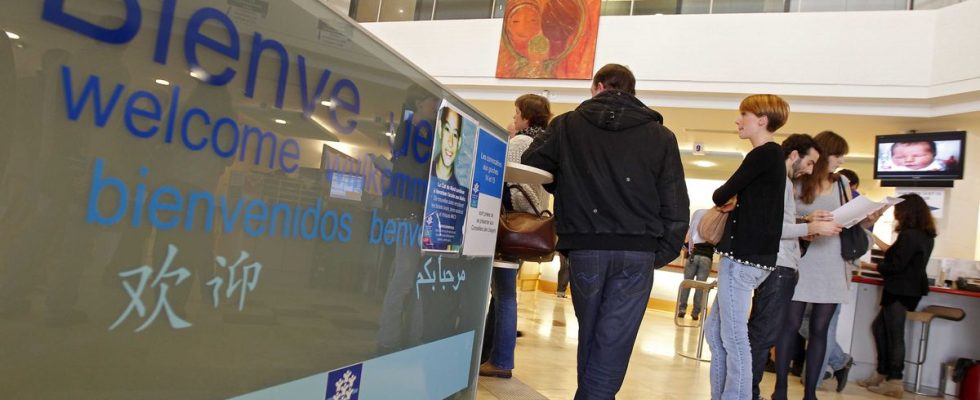The active solidarity income, or RSA, costs the departments a lot of money. The North, champion of the RSA, drops tens of millions of euros per year to its approximately 89,000 beneficiaries. A financial burden that is less and less compensated by the State which is becoming unmanageable at the department level, as successive presidents of the community regularly denounce. So, when the government spoke of an experiment to focus on the integration of RSA beneficiaries, the Nord jumped at the chance. And it was Tourcoing, stronghold of Gérald Darmanin, which was chosen. However, there was a bit of confusion about the device.
Arriving early in the afternoon, Thursday, at the Tourcoing employment center, 20 minutes was able to observe an astonishing effervescence. Staff in blue vests running in all directions, residents passing from room to room, stack of CVs under their arms. “It’s a job dating event for RSA recipients,” explains an employee. We are directed to the first floor where the “France travail” stage is installed, the famous experiment. The place is calmer, which allows us to speak quietly with Amel, a young woman of 25 who applied for RSA in September. “A few days after registering with CAF, I was called here to meet an advisor. Since then, I see him for an hour every ten days to take stock,” she tells us.
Beneficiaries work for themselves
Is it true that between each meeting, he is asked to work 15 to 20 hours per week for free? The young woman laughs: “I have to be active, that means participating in workshops, writing CVs, sending applications, going to job dating, interviews… this is the type of activity we are talking about . » “That this experiment was intended to make RSA recipients work voluntarily is a rumor launched by the far left,” sweeps away Doriane Becue, the mayor of Tourcoing. “The goal is to support these people so that they find work or training,” adds the elected official.
In Tourcoing, 3,000 beneficiaries were included in the new system, with a budget of one million euros. On the dedicated platform, staff from Pole emploi and the department work together to find a solution. “The recipient’s journey is simpler, more fluid, the contacts are on site and it does not take weeks to get them an appointment with social services,” explains Jean-Luc Ranty, the “coach” of ‘Amel. This departmental official monitors 50 beneficiaries, “compared to 150 for a Pole emploi advisor”, he specifies. “He knows me, he knows my background and what I’m looking for. This allows him to offer me job offers or suitable training,” insists the young woman.
“I know people who are happy with it but not me”
For her, the 350 euros of RSA is not a goal in itself: “I know people who are satisfied with it but not me. I have a BTS in assistant manager and I want to find a job in this field. If I take a job that I don’t like, I won’t do it to the fullest,” admits Amel. “There is no stick, beneficiaries can of course refuse proposals that do not suit them,” assures Stéphanie Feron, who directs the experiment for the North. “There is a check of what the beneficiary has done between two meetings, but it is more declarative, we are in a relationship of trust,” adds the coach.
Amel leaves us with her fingers crossed, she has to have her second interview of the day. “The people in the system are very willing and very often do much more than the 15 to 20 hours requested,” says Doriane Becue. She puts forward the case of a young man who wanted to become a bus driver: “We found him an immersion in a transport company and, as he liked it, we combined the various aids to finance his training”, continues -She. No need, therefore, to run to the doors of the region, the department, the employment center, everything can be done on site and quickly. A workshop to refine your CV, coaching to sell yourself to employers, a need for training, a desire for immersion… Everything is planned in the same place.
In fact, it is more common sense that this should happen if the government’s goal is indeed to tickle full employment. “Since the start of the experiment, we have had a rate of around 50% of positive exits, either towards a fixed-term contract, a permanent contract or training,” estimates the mayor of Tourcoing. The department has also asked to extend the experiment to Roubaix, Dunkirk, Maubeuge and Denain. Enthusiastic, the elected official is banking on a quick green light from the government for these municipalities, as she believes in “the generalization of the system across France for 2025”.

